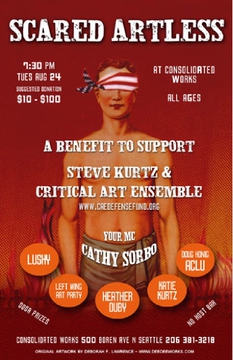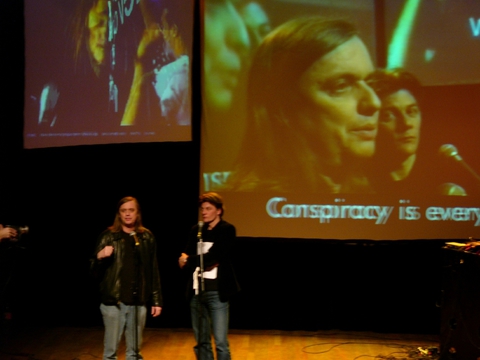Search results for 'art of campaigning'
Introduction to the Clean Clothes Campaign
* What's all this campaigning about?
* The structure of the CCC
CCC AREAS OF ACTIVITY
* Putting Pressure on Companies
* Consumers: Raising Awareness and Pressing for Change
* Legal Possibilities?
* Solidarity Work
* Frequently Asked Questions about the CCC
* Where you can find us
Tatiana Bazzichelli
Tatiana Bazzichelli (it/de) is a researcher, networker and curator, working in the field of hacktivism and net culture.
Konrad Becker
Konrad Becker is a pioneer in media art and electronic music. He is known for initiating seminal and controversial net-culture projects. A thinker and activist, he has curated and organized a large number of international conferences and exhibitions. His recent book, "Strategic Reality Dictionary" published by Autonomedia, addresses issues of cultural agency beyond the tactical. He now runs the World-Information Institute in Vienna, doing critical research into culture and technology.
ReadRaul Marroquin
Raul Marroquin was born in Bogota, Colombia, in 1948 and has lived in the Netherlands since 1971. He has worked with film, video and photography as well as installations. He is considered one of the pioneers of video art in the Netherlands.
ReadLuchezar Boyadjiev
Luchezar Boyadjiev is a Bulgarian artist, working and living in Sofia,
Bulgaria. As an Eastern European artist he often found himself in
the position of a GastArtBeiter
after the fall of Communism in EE.
Florian Schneider
Florian Schneider is a filmmaker, writer, and developer in the fields of new media, networking and open source technologies. In his work he focuses on bordercrossings between mainstream and independent media, art and activism, theory and technology.
ReadSWARMACHINE
Activist Media Tomorrow*
* BH: When I wrote this text five years ago, it really was not clear whether
the swarming tactics of the counter-globalization movement would get a
"second chance." But they have, and now the subtitle could be "activist
media today."
What happened at the turn of the millennium, when a myriad of recording
devices were hooked up to the Internet and the World Wide Web became an
electronic prism refracting all the colors of a single anti-capitalist
struggle? What kind of movement takes to the barricades with samba bands
and videocams, tracing an embodied map through a maze of virtual
hyperlinks and actual city streets? The organizational aesthetics of the
networked movements was called "tactical media," a concept that mixed
the quick-and-dirty appropriation of consumer electronics with the
subtle counter-cultural anthropology of Michel de Certeau. The idea was
to evoke a new kind of popular subjectivity, constitutionally "under the
radar," impossible to identify, constantly shifting with the inventions
of digital storytelling and the ruses of open-source practice. Too bad
so much of this subversive process was frozen into a single seductive
phrase.
Marko Peljhan
Born 1969 in Nova Gorica, Slovenia, Peljhan in 1992 graduated from the Academy for Theatre, Radio, Film and Television in Ljubljana. Also in 1992 he founded the arts organization 'Projekt Atol' and in 1995 Project Atol`s technological branch 'Pact Systems' (Projekt Atol Communication Technologies) in the frame of which he carries out research in the fields of performance, technology applications, radio, sound, video, film, lectures and situations.
ReadAndy Cameron
Co-author with Richard Barbrook of the infamous Californian Ideology essay (1995).
ReadPaul Garrin
b 1957 in Philadelphia (USA); 1978?82 study of art at the Cooper Union
of Art, New York (USA), under Hans Haacke, Vito Acconci and Martha
Rosler, degree of Bachelor of Arts; since 1981 in cooperation with Nam
June Paik; 1985 starting his own production of tapes and installations;
1990 Artist in Residence at the Video Fest Berlin (D); lives in New
York (USA).
Brian Holmes
Brian Holmes, is an art critic, theorist and activist, particularly involved with the mapping of contemporary capitalism.
ReadCan Internet technology still revolutionize activism?
One of the biggest promises of the Internet was the transformation of political activism. No longer would change come about solely through the actions of large organizations, claimed the Web's early enthusiasts. Now, they claimed, individuals could rouse the concern of their fellow citizens for a particular cause through Web sites, e-mail, and online petitions. Those who normally shunned demonstrations and limited their participation in the public sphere could be contacted personally in their e-mail box, and all that would be necessary for them to do to show their support would be to click a button or fill in a field. Soon, pundits predicted, there would be a revolution in grassroots participation in the political process.
ReadFurtherfield
Furtherfield is an artist organisation founded by artists Ruth Catlow and Marc Garrett in 1997
and sustained by the work of its community as the Internet took shape
as a new public space for internationally connected cultural production.
Jordan Crandall
Jordan Crandall is an artist, theorist, and performer based in Los Angeles. His video installations, presented in numerous exhibitions worldwide, combine formats and genres deriving from cinematic and military culture, exploring new regimes of power and their effects on subjectivity, sociality, embodiment, and desire. Crandall writes and lectures regularly at various institutions across the US and Europe. He is the 2011 winner of the Vilém Flusser Theory Award for outstanding theory and research-based digital arts practice, given by the Transmediale in Berlin in collaboration with the Vilém Flusser Archive of the University of Arts, Berlin. He is currently (2012) an Honorary Resident at Eyebeam art and technology center in New York, where he is continuing the development of a new body of work that blends performance art, political theater, philosophical speculation, and intimate reverie. The work, entitled UNMANNED, explores new ontologies of distributed systems -- a performative event-philosophy in the form of a book and a theatrical production. He is also the founding editor of the new journal VERSION.
ReadNot An Alternative
Not An Alternative is a non-profit organization based in Brooklyn, New York, whose mission aims to integrate art, activism and theory in order to affect popular understandings of events, symbols and history. The organization operates a multi-purpose venue named The Change You Want to See Gallery and Convergence Stage, where free and low-cost lectures, screenings, panel discussions, workshops and artist presentations occurs. The space also consists of a production workshop, filming studio and video editing suite. During the day it is a collaborative office space (aka coworking) for like minded cultural producers.
Nathalie Magnan
Nathalie Magnan is an artist and theoretician. She produced video essays for Paper Tiger TV, Deep Dish TV as well as for Canal+.
ReadFuzzy Biological Sabotage
If the left has learned anything from resistance against capital driven technocracy, it is that the democratic process is only minimally useful for slowing the profit machine of pancapitalism. Since corporations and other capital-saturated institutions own the process, and tend to function outside national democratic imperatives, other methods of power appropriation have to be developed. In the case of biotechnology, the resistance is unfortunately in a position of reactivity. Corporations have already infiltrated most governments and markets at such a furious pace that all that can be done is attempt to slow them down, while cells and organizations regroup and decide on a way to address the many problems that have already arisen, and the many potential accidents that are in front of us.



